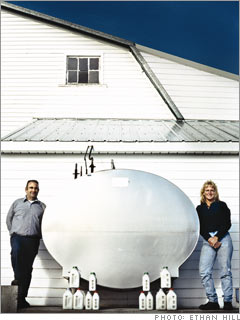It's Phinney's job to tune in to both frequencies, the farmers and the corporate interests - for example, reminding Whole Foods' tech-savvy higher-ups that "not all farmers have e-mail addresses," while explaining to the farmers that they can't use plastic laundry tubs to haul their produce to Whole Foods' loading docks. ("That's okay for farmers' markets, but for us to accept your product you need to use clean, new, recyclable boxes," she informs them.)
The barrage of questions and tips Phinney puts to farmers gives new meaning to the idea of vendor care. "Call me if one of our produce buyers hasn't contacted you before you place your seed order next month," she cautions Colson as they lean against his barn and look across his dormant fields. "We should communicate about our standards for size and variety, so you don't roll up to the loading dock next summer with a load of veggies and then have us reject them." Rejection of deliveries is rare - less than 5 percent of volume - according to Whole Foods' staff, and usually for produce that's past its prime.
| |

